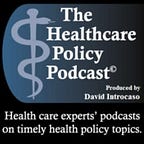US healthcare emits a massive amount of carbon pollution at approximately 600 million tons annually or roughly 9% of total US greenhouse gasses. Because of the rapid increase in climate crisis-related harms projected economic losses worldwide over the next few years are estimated in the trillions. Consequently, the US is beginning to follow Brazil, Canada, France, Japan, Switzerland and the UK in mandating GHG emission and climate-risk disclosures. Most noteworthy, in April 2022 the Security Exchange Commissions (SEC) issued a proposed rule, anticipated to go final this month, that will require publicly traded companies to disclose information about climate-related financial risks and financial metrics to inform investors in making corporate investment and voting decisions. Just recently the California governor signed a “Climate Accountability Package,” the White House in late September charged the OMB to work with fed agencies to measure GHG emissions in order to calculate impacts on fed programs and the European Union has moved related reporting regulations that will impact American companies doing business overseas.
During this 34 minute interview Ms. Hanawalt begins by outlining the proposed SEC climate disclosure rule. She next outlines CA’s “Climate Accountability Package (S253 and S261) that address CA reporting for different sized private and public companies and discusses related European Union regulatory rules.
Ms. Cynthia Hanawalt is the Director of the Sabin Center’s financial regulation practice. Her work supports regulatory and policy responses to climate-related financial risk at the federal and state level and includes a focus on the complex intersections of ESG and antitrust law with sustainability goals and climate resiliency measures. Ms. Hanawalt is affiliated with Columbia Climate School and the Initiative for Climate Risk & Resilience Law. Prior to joining the Sabin Center, Ms. Hanawalt served as Chief of the Investor Protection Bureau for the New York State Office of the Attorney General and was a litigation partner at the firm Bleichmar Fonti & Auld. She was graduated from Columbia Law School where she was a Harlan Fiske Stone Scholar and Duke University where she received the William J. Griffith University Service Award.
For more information regarding climate disclosure see these Sabin Center writings:




